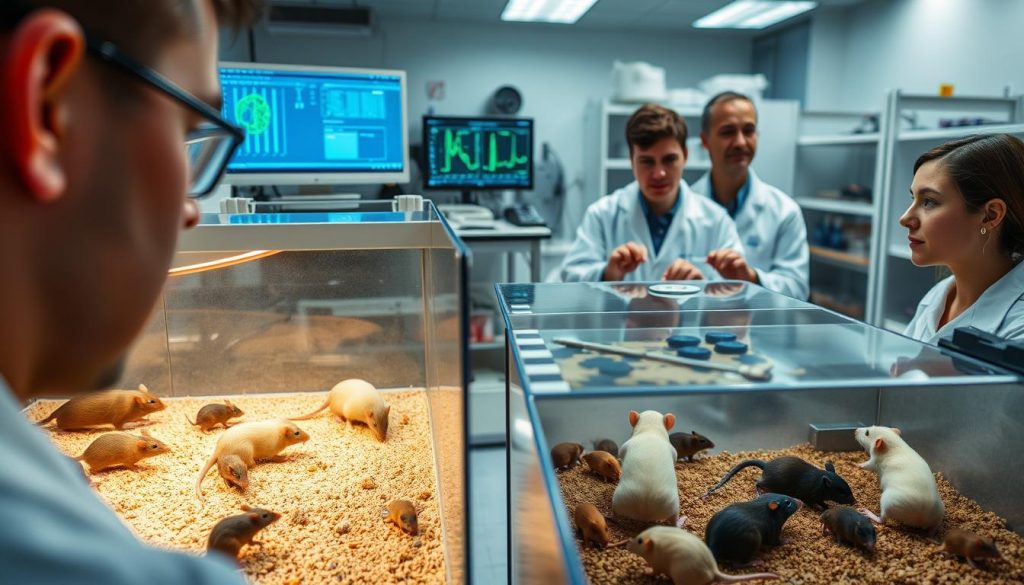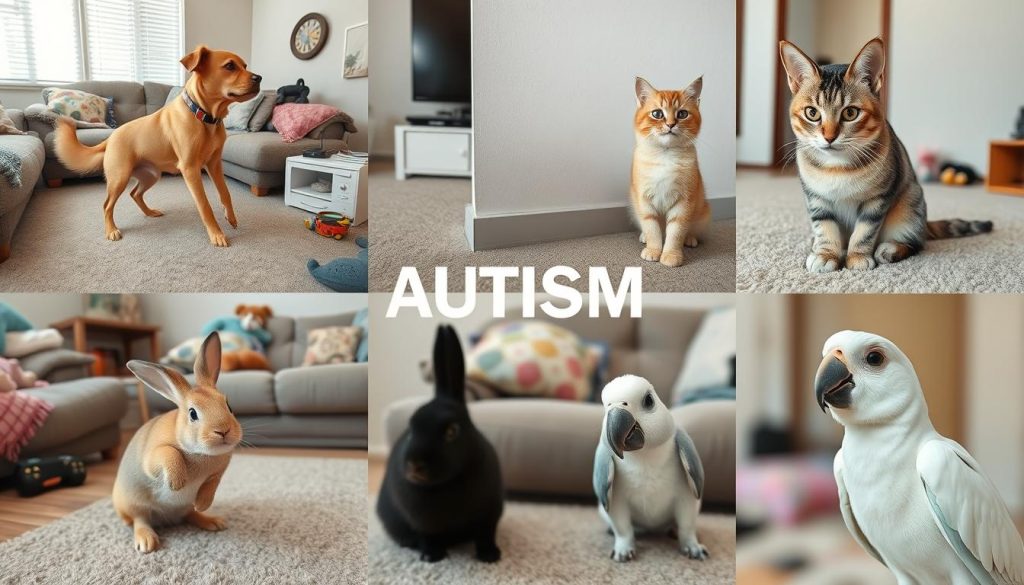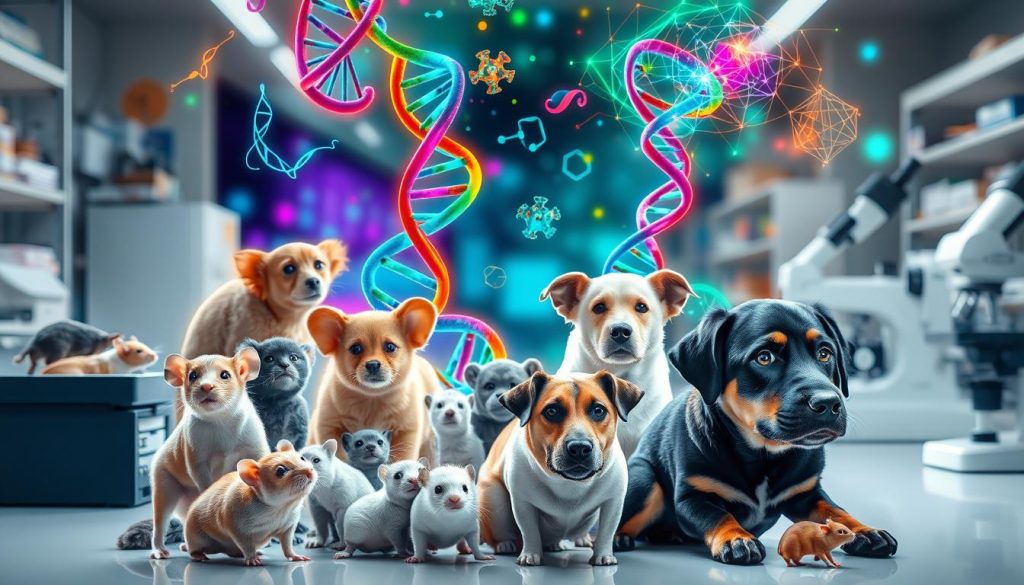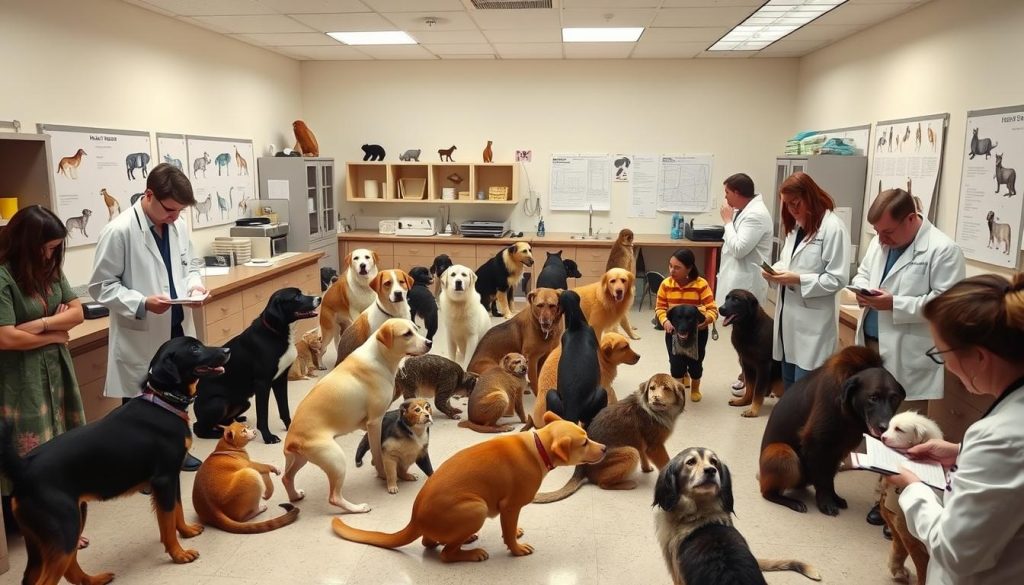Scientists and pet owners are curious about autism in animals. They wonder if animals can have autism. This question leads to interesting research on animal behavior.
Studies on animal autism are revealing how different creatures see the world. Researchers are looking for signs of autism in animals, just like in humans. This could change how we care for our pets.
By studying autism-like behaviors in animals, we might learn more about it. This could help us understand both animal and human neurodiversity better. It could lead to better care and support for all.
Understanding Animal Behavior and Neurodiversity
Animal behavior is fascinating to scientists and pet owners. Studying autism in animals helps us understand brain functions across species.
The Complex Nature of Animal Cognition
Animals have different cognitive abilities. Some solve problems, while others show empathy. This variety makes studying autism in animals both hard and rewarding.
Defining Neurodiversity in the Animal Kingdom
Neurodiversity in animals means natural brain and behavior differences. Like humans, animals have unique traits. Researchers study these to understand animal autism.
Current Scientific Perspectives
Scientists find interesting links between human autism and animal behaviors. Studies on mice, primates, and dogs show similarities. This research helps us understand animal cognition and human neurodevelopmental conditions.
| Species | Observed Autism-Like Behaviors |
|---|---|
| Mice | Repetitive grooming, reduced social interaction |
| Primates | Lack of eye contact, stereotyped movements |
| Dogs | Fixation on objects, unusual sensory responses |
As research continues, we learn more about animal autism. This knowledge improves animal care and broadens our understanding of neurodiversity.
Can Animals Have Autism: Current Research Findings
Scientists are studying autism in animal models to see if animals can have autism. Recent studies have shown interesting insights into autism-like behaviors in different species.
A study on mice with autism-linked genes found they had trouble with social interactions and repetitive actions. This shows similarities between human autism and animal behaviors.

Research on primates has also shown promising results. Rhesus macaques with autism-like traits had less eye contact and unusual social behaviors, just like humans with autism.
Other animals have also shown autism-like behaviors:
- Dogs with repetitive tail-chasing
- Horses that are very sensitive to their environment
- Dolphins with odd social patterns
While these findings are exciting, scientists warn against making direct comparisons between animal behaviors and human autism. Autism is complex and needs more study to understand it fully across species.
| Animal | Observed Behavior | Similarity to Human Autism |
|---|---|---|
| Mice | Social difficulties, repetitive behaviors | High |
| Rhesus Macaques | Reduced eye contact, atypical social interactions | High |
| Dogs | Repetitive tail-chasing | Moderate |
| Horses | Heightened environmental sensitivity | Moderate |
| Dolphins | Unusual social patterns | Low to Moderate |
As research continues, scientists aim to learn more about autism across species. This could lead to better understanding and treatments for both animals and humans.
The Science Behind Animal Autism Spectrum Disorder
Scientists are finding interesting connections between human and animal brains. This research helps us understand animal autism spectrum disorder and autism symptoms in different species. Let’s dive into the science behind this field.
Neurological Similarities Between Species
Studies show that humans and animals have similar brain structures. Many animals have neural pathways related to social behavior and sensory processing. These similarities help researchers study autism-like traits across species.
Brain Structure Comparisons
Certain brain areas show changes in both human autism and animal models. The amygdala, which handles emotions, often differs in size and activity. The cerebellum, key for motor skills, may also vary in animals with autism-like behaviors.
| Brain Region | Human Autism | Animal Model |
|---|---|---|
| Amygdala | Enlarged | Enlarged in mice |
| Cerebellum | Reduced size | Smaller in primates |
| Hippocampus | Altered structure | Similar changes in rats |
Genetic Markers and Their Significance
Genetic research shows that humans and animals share autism risk genes. Over 100 genes linked to autism in humans have been found. These genes play roles in brain development and function in animals too. This genetic overlap helps researchers create better animal models for studying autism spectrum disorders.
Observable Autism-Like Behaviors in Animals
Animals can show behaviors that look like autism in humans. These signs in pets and animals have caught scientists’ eyes. They study many species to learn more about these traits.
Dogs might spin or chase their tails over and over. Cats could avoid eye contact or get upset by changes. These actions remind us of some autism traits in people. Horses can be very sensitive to touch or sound, like people with autism.
Primates give us clues about autism-like behaviors. Some chimpanzees repeat movements or have trouble with social interactions. Rhesus monkeys with certain genes might not make eye contact or engage socially.
- Repetitive movements or vocalizations
- Difficulty with social interactions
- Unusual responses to sensory stimuli
- Resistance to changes in routine
Researchers see these behaviors in many animal species. They want to find out why and how to help. This study helps us understand animal behavior and human autism better.
Studying Autism Through Animal Models
Scientists use animal models to study autism, helping unlock its mysteries. These models offer insights into brain function and behavior. Researchers focus on mice and primates to explore autism’s complex nature.
Mouse Models in Autism Research
Mice play a key role in studying autism in animal models. Their genes can be altered to mimic autism-like traits. This helps scientists test treatments and understand genetic factors.
Mice studies have led to discoveries about social behavior and brain development in autism.
Primate Studies and Their Impact
Primates offer unique benefits for autism research. Their brains are more similar to humans, making them valuable for studying complex behaviors. Nonhuman animal autism studies in primates have revealed important information about social communication and cognitive processes related to autism.
Ethical Considerations in Animal Research
Animal research raises ethical questions. Scientists must balance the need for knowledge with animal welfare. Strict guidelines ensure humane treatment of research animals.
Researchers work to minimize distress and use alternatives when possible.
| Animal Model | Advantages | Limitations |
|---|---|---|
| Mice | Easy genetic manipulation | Limited social complexity |
| Primates | Similar brain structure to humans | Ethical concerns, high cost |
| Zebrafish | Rapid development, transparent embryos | Less complex nervous system |
Recognizing Signs of Autism in Pets
Pet owners often wonder about signs of autism in pets and how they might differ across species. While autism is mainly diagnosed in humans, animals can show behaviors that look like autism spectrum disorders. Knowing these signs can help pet owners care for their furry friends better.

Spotting autism symptoms in different species needs careful watching. Dogs might show repetitive actions, social issues, or be sensitive to sounds. Cats could make odd sounds or stick too closely to routines. It’s important to remember these behaviors could come from many things, not just autism.
Common signs to watch for include:
- Lack of eye contact
- Repetitive movements
- Unusual reactions to sounds or textures
- Difficulty socializing with other animals
- Intense focus on specific objects
If you see these behaviors in your pet, it’s key to talk to a vet. They can figure out if the behaviors are due to autism-like traits or other health problems.
| Species | Common Autism-Like Behaviors | Potential Causes |
|---|---|---|
| Dogs | Tail chasing, paw licking, avoiding eye contact | Anxiety, compulsive disorders, sensory issues |
| Cats | Excessive grooming, fear of changes, unusual vocalizations | Stress, medical conditions, genetic factors |
| Birds | Feather plucking, repetitive movements, social withdrawal | Boredom, nutritional deficiencies, environmental stressors |
Remember, each pet is unique, and behaviors can vary a lot. Getting a correct diagnosis and the right care is key for animals with autism-like traits.
Social Communication Patterns in Animals
Animals, like humans, have complex social structures and ways to communicate. These patterns vary across species and can be affected by autism-like behaviors in animals. Understanding these differences sheds light on autistic traits across species and helps us grasp the nuances of animal cognition.
Group Dynamics and Social Bonds
Many animals form strong social bonds within their groups. Wolves hunt in packs, dolphins swim in pods, and primates groom each other to strengthen relationships. These interactions are key for survival and reproduction. Animals with autism-like behaviors may struggle to fit into these social structures, showing behaviors similar to those seen in humans with.
Communication Differences in Affected Animals
Animals exhibiting autism-like behaviors often display unique communication patterns. They might:
- Avoid eye contact with other animals
- Struggle to interpret social cues
- Show less interest in play or social grooming
- Prefer solitary activities over group interactions
These differences can impact an animal’s ability to integrate into their social group. By studying these patterns, researchers gain valuable insights into autism-like behaviors in animals and how they compare to human autism traits. This research is key for understanding the spectrum of autistic traits across species and developing better support strategies for affected animals.
Genetic Factors in Animal Autism Research
Scientists are exploring the genetic causes of animal autism spectrum disorder. They study autism in animal models to learn more about neurodevelopmental conditions. This research helps find genetic markers linked to autism-like behaviors in different species.

Recent studies show that humans and animals share genetic pathways for autism-like traits. For instance, scientists found specific genes in mice that cause behaviors similar to human autism. This discovery is a big step towards understanding autism’s genetic roots.
Researchers have found “risk genes” in both humans and animals. These genes, when changed, can lead to autism-like behaviors. By studying these genes in animals, scientists aim to find new treatments.
This research goes beyond finding single genes. It looks at how many genes work together to affect brain development and behavior. This approach is key to fully grasping autism in animals and humans.
Environmental Influences on Animal Behavior
The environment shapes animal behavior, including autism-like traits. Living conditions and stress can affect how animals act and show autism symptoms.
Impact of Living Conditions
Animals’ homes greatly shape their behavior. Small or dull spaces can cause animals to repeat actions, like some autistic people do. For example, zoo animals in tight spots often move in the same way, showing signs of autism.
Stress Factors and Behavioral Changes
Stress can make animals act like they have autism. Changes, loud sounds, or new places can make animals show signs of autism. These signs include:
- Increased anxiety or fear responses
- Difficulty adapting to new situations
- Unusual vocalizations or communication patterns
- Repetitive movements or self-soothing behaviors
Knowing how the environment affects animals helps researchers understand autism-like behaviors. It shows the need for supportive, enriching places for animals, even those with neurodiversity.
Diagnosing Autism-Like Behaviors in Animals
Figuring out if pets have autism is hard for vets and animal experts. Animals can’t talk, so it’s tough to know if they feel autism like we do. Experts watch how animals act and check their brains to spot signs of autism.

- Repetitive movements or actions
- Difficulty socializing with other animals
- Unusual responses to sensory stimuli
- Resistance to changes in routine
- Lack of eye contact or social engagement
These signs might look like autism, but they can also mean other things. Stress, anxiety, or health issues can cause similar behaviors. So, it’s hard to say for sure if an animal has autism.
To figure out if animals have autism, experts use a few methods. They watch how animals act, test their genes, and look at their brains. They’re trying to find ways to understand autism in animals better.
| Diagnostic Method | Description | Limitations |
|---|---|---|
| Behavioral Assessment | Observing animal behavior patterns | Subjective interpretation |
| Genetic Testing | Analyzing DNA for autism-related genes | Limited knowledge of animal autism genetics |
| Brain Imaging | Examining brain structure and function | Expensive and requires specialized equipment |
As we learn more, we get better at understanding animals with autism-like traits. This helps us care for them better. It also gives us new insights into human autism.
Treatment and Support for Affected Animals
Animals with autism-like behaviors need special care. Veterinarians and animal behaviorists work together. They create plans for different species.
Behavioral Modification Techniques
Experts use positive reinforcement. This method rewards good actions. For example, a dog might get a toy and praise for playing with it.
Environmental Adaptations
Changing an animal’s environment can help a lot. Quiet spaces, calming colors, and regular routines reduce stress. This is good for animals with autism-like behaviors.
Professional Support Options
There are many professional services for animals with autism-like behaviors:
| Service | Description | Benefits |
|---|---|---|
| Animal Behaviorists | Assess and develop behavior modification plans | Tailored strategies for individual animals |
| Veterinary Neurologists | Diagnose and treat neurological conditions | Medical management of autism-like symptoms |
| Animal Therapists | Provide sensory integration therapy | Improved sensory processing and behavior |
By using these methods, caregivers can help animals with autism-like behaviors. This improves their life and helps them fit in better.
Comparing Human and Animal Autism Traits

Scientists have long wondered if animals can have autism. Recent studies suggest that autistic traits across species may share similarities. This research opens new avenues for understanding neurodiversity in both humans and animals.
In humans, autism often manifests as difficulties in social interaction and communication. Animals with autism-like behaviors may show similar signs. For example, some dogs might avoid eye contact or struggle with social cues from other canines. Primates in research settings have displayed repetitive behaviors reminiscent of human autism traits.
Sensory sensitivities are another common feature of autism in humans. Animals can exhibit comparable reactions. Horses with autism-like traits may startle easily at sudden noises or movements. Cats might become overly stressed in chaotic environments, mirroring sensory overload experiences in autistic individuals.
| Trait | Humans | Animals |
|---|---|---|
| Social Interaction | Difficulty reading social cues | Avoidance of eye contact in dogs |
| Repetitive Behaviors | Stimming or specific routines | Repetitive movements in primates |
| Sensory Sensitivities | Overwhelmed by loud noises | Startled reactions in horses |
While these comparisons are intriguing, it’s important to remember that diagnosing autism in animals is challenging. The complex nature of animal cognition and behavior requires further research to fully understand the extent of autistic traits across species.
Impact on Animal Care and Welfare
Recognizing signs of autism in pets has changed how we care for them. Veterinarians and animal behaviorists now treat animals with autism-like behaviors. This has made many pets’ lives better by addressing their unusual behaviors.
Animal shelters now have special care for pets with autism-like traits. They provide calm spaces, regular routines, and special socialization plans. This has helped more of these pets find homes, improving their lives.
Zoos and wildlife sanctuaries have also changed their ways. They create special enclosures and activities for animals with autism-like behaviors. This has lowered stress and improved the well-being of these animals.
| Setting | Care Adaptations | Observed Benefits |
|---|---|---|
| Veterinary Clinics | Quiet examination rooms, minimal handling | Reduced anxiety during visits |
| Animal Shelters | Consistent routines, calm environments | Improved adoptability |
| Zoos | Specialized enclosures, tailored enrichment | Lower stress levels, better well-being |
Understanding autism-like behaviors in animals has a big impact. It has led to more research on animal cognition and emotions. This research helps us care for animals more compassionately and effectively in many settings.
Future Directions in Animal Autism Research
The study of autism in animals is growing fast. It’s opening up new ways to understand this complex condition. Scientists are finding new ways to study autism in animals, leading to exciting discoveries.
Emerging Study Methods
Researchers are using new methods to study autism in animals. They use advanced brain imaging to map neural pathways. They also use genetic sequencing to find genes linked to autism across species.
- 3D brain mapping
- Single-cell RNA sequencing
- Optogenetics for neural circuit manipulation
Potential Breakthroughs
The future of studying autism in animals looks promising. Scientists hope to make big strides in understanding autism. They aim to uncover the genetic and environmental causes of autism spectrum disorders.
| Research Area | Potential Impact |
|---|---|
| Gene therapy | Targeted treatments for specific autism-related genes |
| Microbiome studies | Links between gut bacteria and autism symptoms |
| Social behavior modeling | Improved interventions for social communication challenges |
As research continues, we may see better ways to diagnose and treat autism. This could help both animals and humans with autism spectrum disorders.
Supporting Animals with Autism-Like Behaviors
Caring for animals with autism-like behaviors needs patience and understanding. Pet owners and caregivers are key in creating a supportive space. Recognizing signs of autism in pets is the first step to giving them the care they need.
Creating a calm, predictable space helps animals with autism feel secure. Keeping routines consistent, like regular feeding times and daily activities, is important. Some pets might need quiet areas to retreat when feeling overwhelmed.
Getting professional help is very important. Veterinarians and animal behaviorists can provide advice and treatment plans. They might suggest specific training or changes to the environment to help the animal.
Every animal is different, even those showing signs of autism. What works for one might not work for another. With compassion and the right support, animals with autism-like behaviors can thrive and build strong bonds with their caregivers.
FAQ
Q: Can animals truly have autism?
A: Animals can show behaviors that seem like autism in humans. But, we can’t officially say animals have autism like we do in humans. Scientists are studying these behaviors to learn more about neurodiversity in animals.
Q: What are some signs of autism-like behaviors in pets?
A: Pets might show signs like repeating actions, trouble with social interactions, and being very sensitive. They might also communicate differently. Always talk to a vet to make sure these signs aren’t from another health issue.
Q: How do researchers study autism in animal models?
A: Researchers use animals like mice and primates to study autism. They watch how these animals interact and communicate. They also look at their genes and brains to find similarities with human autism.
Q: Are certain animal species more likely to exhibit autism-like behaviors?
A: Autism-like behaviors have been seen in many animals, including dogs, cats, and primates. But, we don’t know if some animals are more likely to show these traits. Scientists are studying this to learn more.
Q: How can pet owners support animals with autism-like behaviors?
A: Owners can help by making a stable home, reducing stress, and giving fun activities. Working with a vet or animal behaviorist is key to creating a care plan for the animal.
Q: What are the ethical considerations in studying autism in animals?
A: Studying autism in animals must consider their well-being. Researchers must follow strict rules to protect animals and ensure the research is worth it. This includes minimizing stress and following animal welfare laws.
Q: How do environmental factors influence autism-like behaviors in animals?
A: Things like where an animal lives, stress, and who they interact with can affect their behavior. These factors might make autism-like behaviors worse. Scientists are studying how genes and environment work together.
Q: What genetic factors are associated with autism-like behaviors in animals?
A: Some genes linked to autism in animals have been found, mainly in mice. These genes are involved in brain development and social behavior. But, understanding these genes is complex and ongoing.
Q: How do social communication patterns differ in animals with autism-like behaviors?
A: Animals with autism-like behaviors might have trouble with social cues and communication. They might not make eye contact or have unusual sounds. These differences vary by species and individual.
Q: What future developments are expected in animal autism research?
A: Future research might use better brain imaging, genetic studies, and ways to assess behavior. These could help us understand neurodiversity better. This could also lead to new treatments for animals and humans.


















